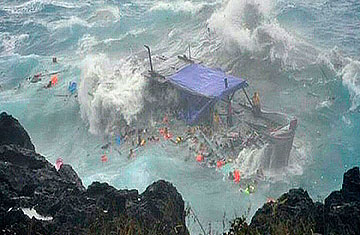
At least 27 asylum seekers died when a small wooden boat hit rocks off Christmas Island
Kamar Ismail was driving to the shops Wednesday morning, Dec. 15, when he saw a small group of people gathered near the edge of a cliff, not far from his home on Christmas Island, an Australian atoll 1,600 miles (2,600 km) northwest of Perth. It was just 7 a.m., and upon seeing the crowd, he knew that something was wrong. As he approached, he looked down and saw a small boat being thrashed about in the waves. "People were waving for help," he says. "Then a few waves crashed into the boat, and it was smashed to pieces." Ismail says he witnessed one death but couldn't tell how many others perished. "It was horrible," he says. "There were many women and children screaming. I couldn't really tell apart the bodies from debris."
The small wooden boat is believed to have been carrying as many as 100 people, mainly from Iran and Iraq, when it went down in sight of shore. A frantic rescue effort ensued. So far, 28 bodies have been recovered, Australian officials said. Forty-two people survived the ordeal, though some are seriously injured. "The walking wounded have injuries like cuts or hypothermia," says Lesleigh Green of the Royal Flying Doctor Service, a nonprofit that provides emergency medical care. "There are two people that need to be transformed to the mainland, one with severe abdominal injuries and another with severe head injuries."
Critics say the accident was waiting to happen. This year a record number of refugee-filled boats have arrived in Australian waters. Those aboard the boat that sank today — believed by police, according to the Christian Science Monitor, to be mostly Iraqis on an Indonesian vessel — will join a 6,232-person-long list of asylum seekers who have made the journey this year, many on rickety fishing boats unfit for passage. Boats carrying refugees "are always overloaded," says Mark Rochfort, who runs a fishing charter service on Christmas Island. "The people on board never look that happy to be there," he says. "They generally look seasick and not very happy."
The issue of asylum seekers has divided Australia for years, though it is too early to know how this tragedy will play politically. So far the government appears to be taking a cautious approach. "This has been a tragic event," Prime Minister Julia Gillard said in a statement. "It will be some time before there is a full picture of what has happened." She is cutting short her vacation to monitor the situation.
The opposition Liberal Party, which has been critical of Gillard's immigration policy, kept quiet Wednesday. "What has occurred today off the cliffs of Christmas Island represents our worst fears realized," said Scott Morrison, opposition spokesman for immigration, in a statement. "Today is a day for sadness, not for policy discussion and analysis."
Others were less inclined to hold their tongue. Andrew Bolt, a commentator for the Herald Sun, described the tragedy as "utterly predictable." He included a link to an article he wrote in November 2009 in which he accused former Prime Minister Kevin Rudd and his Labor Party of "luring people into such lethal voyages through his sheer foolishness, political opportunism and vanity." In 2007, Rudd abandoned the unpopular "Pacific Solution," an offshore processing center in Nauru and Manus Island in Papua New Guinea, in favor of Christmas Island. Ever since, the number of asylum seekers paying smugglers to hop onto ramshackle boats from Indonesia to Australia has spiked. Today, the Christmas Island detention center is almost full.
In July, Gillard announced plans to move the so-called boat people to East Timor, an idea that was ironically reminiscent of the facility her colleague Rudd had closed. Her immigration problems were further compounded by protests. In November, 10 detainees sewed their lips shut, while about 200 took part in a hunger strike in an attempt to bring attention to the slow processing of their visa applications at Christmas Island. Meanwhile, in Villawood, a detention center in southwestern Sydney, protests erupted when a 41-year-old asylum seeker killed himself, the second such suicide in two months.
Despite the danger, the asylum crisis will likely continue. "People that travel by boat are aware that there are risks but are so desperate that they will take them," says Paul Power, chief executive officer of the Refugee Council of Australia. "Australia is prepared to provide people in need with an opportunity," he adds. "The Australian government can't be blamed for that."
